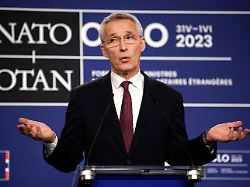No successor in sight
Will Stoltenberg still remain in NATO?
06/22/2023, 5:40 p.m
Shortly after the Russian invasion of Ukraine, NATO Secretary General Stoltenberg extended his mandate for a third time last year. The contract expires in the fall. But the members of the defense alliance want the Norwegian to stay for a while.
“I’m not seeking an extension,” NATO Secretary General Jens Stoltenberg has been saying for weeks. But everything indicates that the 64-year-old will stay with the military alliance until next year. The NATO countries want to ask the Norwegian to extend his term of office, which actually ends in autumn – probably until the anniversary summit in Washington in July 2024, at which the alliance will celebrate its 75th anniversary. This has now been confirmed by British Defense Secretary Ben Wallace, who himself had speculated on Stoltenberg’s successor. “Nothing will come of it,” Wallace told The Economist magazine. According to him, the USA is sticking with Stoltenberg for the time being, who did great service in the Ukraine war.
Federal Defense Minister Boris Pistorius had already pushed ahead at the NATO meeting in Brussels in mid-June: Since there was no alternative to Stoltenberg, he was “of course in favor of an extension, especially since I appreciate the cooperation,” he said. For Stoltenberg it would be the second unscheduled extension by the 31 NATO countries. After the Russian invasion of Ukraine in February 2022, he refrained from moving to the top of the Norwegian central bank in favor of the alliance.
His vast experience in nine years as NATO Secretary General speaks for Stoltenberg. Pentagon boss Lloyd Austin attests him “impressive leadership” in the Ukraine war. The main reason, however, is the disunity of the Europeans in NATO. The 22 EU states in the alliance insist on choosing Stoltenberg’s successor from among themselves. They don’t want to reward Britain for Brexit, which puts Wallace out of the running. However, the EU countries have not yet been able to agree on a common name.
Stoltenberg as a rock in the surf
So further Stoltenberg. Even before the Russian invasion, the sober Norwegian proved to be solid as a rock. For example, with the chaotic NATO withdrawal from Afghanistan. Or in the debate about NATO’s “brain death”, which French President Emmanuel Macron started in response to US President Donald Trump, who had declared the military alliance “obsolete”.
In particularly difficult cases, the NATO Secretary General, whom critics vilify as the “mouthpiece of the United States,” has to demonstrate all his powers of mediation. Against initial reluctance in Berlin, Stoltenberg even managed to get tank deliveries for the Ukraine. In Turkey, he works tirelessly for Sweden’s accession. Even in the ongoing dispute over higher defense spending, he will not give up before the forthcoming summit in Lithuania in July.
When the Social Democrat Stoltenberg took up the post in NATO in October 2014, times were no less turbulent: Russia had just annexed Crimea and more or less openly supported pro-Russian separatists in eastern Ukraine. Stoltenberg then worked on the NATO reinforcements in Eastern Europe, which was increased during the Ukraine war, according to him to 300,000 soldiers.
NATO critic at a young age
When he was young, nobody would have predicted that Stoltenberg would one day be at the head of the military alliance: As a teenager, he smashed the windows of the US embassy in Oslo to protest the Vietnam War. As a young social democrat, he railed against NATO, his black hair flying.
After first ministerial posts, he became Norway’s prime minister in 2000 at the age of only 41. Two more terms followed from 2005 to 2013. Stoltenberg became internationally known after the Utöya massacre in September 2011 with 69 dead. It was then that he managed to comfort his shocked country.
Stoltenberg’s extension at the top of NATO gives some potential successors more time to drum up their own drums. For example the Danish Prime Minister Mette Frederiksen, the Dutchman Mark Rutte or the Spanish Prime Minister Pedro Sánchez.
